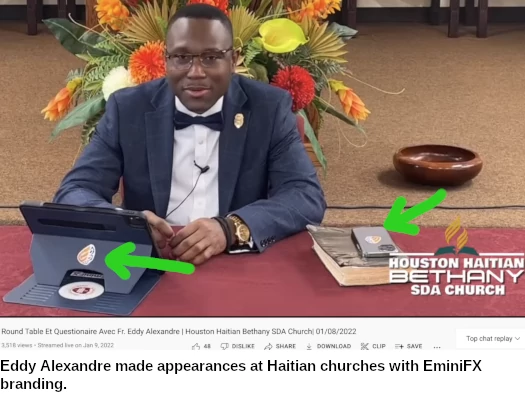
Unsealing of the CFTC’s case today confirms Alexandre is facing both civil and criminal fraud charges.
The CFTC’s case against Alexandre was filed under seal on May 10th.
Following Alexandre’s arrest on May 11th, the CFTC filed a motion requesting their case be unsealed. The court granted the CFTC’s motion on May 12th.
Later that same day the court awarded the CFTC a ex-parte statutory restraining order and injunction against Alexandre.
As a result of this order, an independent Receiver has been put in charge of EminiFX.
The CFTC’s complaint was filed alongside criminal proceedings against Alexandre.
As alleged by the CFTC, Alexandre launched EminiFX on or around September 2021.
Eddy Alexandre, individually and as principal and agent of EminiFX, Inc., has fraudulently solicited, accepted, and pooled at least $59 million from hundreds of members of the general public to purportedly trade foreign currency exchange and cryptocurrencies as well as futures and options in an investment club, when in fact the Defendants misappropriated the vast majority of participant funds to pay participants in a Ponzi-like scheme or for Alexandre’s personal expenses.
The CFTC alleges EminiFX took in $59 million dollars from “hundreds of participants”.
BehindMLM published its EminiFX review back in March, correctly identifying it as a Ponzi scheme.
The ruse behind EminiFX was a trading bot. This is one of the most common MLM Ponzi ruses used today.
As revealed by the CFTC;
- Eddy Alexandre only traded $9 million of the $59 million invested into EminiFX;
- Alexandre did not trade forex and crypto as represented, instead he traded stocks, broad-based index futures, including E-mini S&P 500
futures contracts, E-mini Nasdaq 100 futures contracts, E-mini Russell 2000 futures contracts;
and Dow Futures Mini contracts - of the invested funds he did trade, Alexandre sustained heavy losses ($6.2 million, representing about 70% of the trading principle);
- Alexandre redirected $14.7 million of the $59 million invested into EminiFX to himself;
- significant additional funds were transferred to Alexandre’s “associates”;
- Alexandre lied about EminiFX making participants millionaires;
- Alexandre represented himself to be a millionaire, when in fact he was a twice bankrupt charlatan with a negative net-worth of $122,838 prior to launching EminiFX; and
- at no point was Alexandre or EminiFX registered with the CFTC, as was legally required
Some participant funds were distributed to individuals, including at least $200,000 to one individual. Additional participant funds were donated to charities selected by Alexandre.
Alexandre also used participant funds to pay for business and personal expenses.
For example, Alexandre used participant funds to make payments to BMW, Mercedes Benz, Saks Fifth Avenue, flights, luxury hotels and apparel, and occupational and physical therapy.
Alexandre also used substantial participant funds to rent and furnish office space for EminiFX and to throw “galas” on behalf of EminiFX, which Defendants used to solicit additional contributions from participants.
Alexandre’s conduct constitutes violations of the Commodity Exchange Act, as well as CFTC regulations.
The CFTC’s complaint details six counts of fraud against EminiFX and Alexandre.
Relief requested by the FTC includes:
- confirmation EminiFX and Alexandre violated the Commodities and Exchange Act;
- a permanent injunction;
- disgorgement;
- restitution;
- a civil monetary penalty; and
- legal costs
On May 12th the court granted the CFTC an ex-parte statutory restraining order (SRO). This is the equivalent of the Temporary Restraining Orders we usually see.
The SRO acknowledges the CFTC “has made a proper prima facie showing” that, through EminiFX, Alexandre committed fraud.
As a result of the SRO, EminiFX and its assets have been put under control of a Temporary Receiver. Eddy Alexandre’s assets have been frozen.
The SRO and Temporary Receiver are in place until a scheduled preliminary injunction hearing on May 24th.
On that date, if a preliminary injunction is granted, the EminiFX Temporary Receiver will become permanent.
This will see the process of securing EminiFX assets (including potential clawback from EminiFX’s top promoters and earners), with the aim of eventual distribution to the Ponzi scheme’s victims.
Pending any updates between now and May 24th, our next CFTC EminiFX case update will likely be on May 25th.
I am aware scammers associated with Eddy Alexandre are still holding Zoom calls claiming to represent EminiFX. EminiFX is under control of the Temporary Receiver as of May 12th.
The appointed EminiFX Temporary Receiver is Dave A. Castleman, a partner of the New York law firm Raines Feldman.
Recovery scammers are likely running rife. Contact from anyone regarding EminiFX who isn’t Dave Castleman representing the EminiFX Receivership should be discarded.
In the event scammers impersonate Castleman or the EminiFX Temporary Receivership, know that at no point will the Temporary Receivership ask EminiFX victims for money or make any promises or representations regarding fund recovery.
Anyone who tells you they can get your EminiFX money back is lying to you. Anyone claiming to represent EminIFX, on Zoom calls or otherwise, is lying to you.
Welcome to the Ponzi end-game.
Having covered MLM fraud for over a decade, I can appreciate the frustration of victims. Simply put though; I don’t have the patience for it.
If you want to rage in the comments, “fake news! I put a voodoo curse on your family! etc etc.”, it’ll be marked as spam.
If you want to get angry, take out your frustrations on the scammers who recruited you into EminiFX.
Also a reminder to the YouTube promoters who are still at it: Recruiting people into scams is fraud. It’s just as illegal as running the scams.
“I am not a financial advisor and this is not financial advice” is not a legal defense against Securities and Exchange Act and Commodity Exchange Act violations.
You run the risk of having civil regulatory action filed against you. As well as clawback litigation to recover what you’ve stolen.

